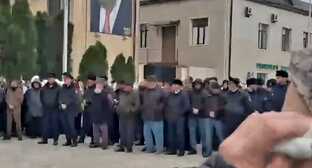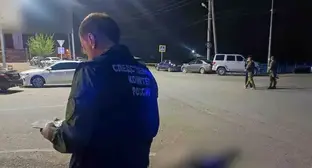09 December 2019, 14:35
Week in the Caucasus: review of main events of December 2-8, 2019
Criminal case against the third president of Armenia; scheduling of early parliamentary elections in Azerbaijan; actions in support of political prisoners in Southern Russia; tension in relations between Russia and Germany in connection with the killing of Zelimkhan Khangoshvili; resignation of the Abkhazian Minister of Internal Affairs amid a protest rally; new detentions in the case on the assassination of the chief of the Ingush Centre "E", – see the review of these and other events in the Caucasus during the week of December 2-8, 2019, prepared by the "Caucasian Knot".
Criminal case against third president of Armenia
On December 4, Serzh Sargsyan, the third President of Armenia, was charged with a large-scale embezzlement. According to the materials of the criminal case, in the period from January 25 to February 7, 2013, Serzh Sargsyan with a group of officials organized the embezzlement, misappropriation, and theft of about 490 million drams (almost 1.03 million US dollars). The court pronounced a pre-trial restriction measure for Serzh Sargsyan in the form of recognizance not to leave. The Serzh Sargsyan's defence claimed a violation of the integrity of the president and demanded to annul the charge and the pre-trial restriction measure. The former president himself denied the theft and called it political persecution. Armenian political analysts interviewed by the "Caucasian Knot" associated the criminal case against Serzh Sargsyan with his political activities.
Scheduling of early parliamentary elections in Azerbaijan
On December 5, Azerbaijani President Ilham Aliev signed a decree on dissolution of the parliament. The elections are scheduled for February 9, 2020. That happened after the political council of the ruling "New Azerbaijan Party" (YAP) took the initiative on November 28. YAP Executive Secretary Ali Akhmedov explained that updating of the composition of the parliament is necessary to support the "reforms carried out by the President." On December 4, the decision on dissolution of the Parliament of Azerbaijan was approved by the Constitutional Court of Azerbaijan. Meanwhile, local political analysts interviewed by the "Caucasian Knot" questioned the legality of the decision pronounced by the Constitutional Court. Besides, according to the political analysts, early elections will severely limit the opposition's ability to enter the parliament and will only strengthen "family power" in Azerbaijan. Despite that fact, two opposition parties - the "Musavat" and the "Republican Alternative" (ReAl) - have already declared their readiness to participate in those elections and use the opportunities of the election campaign to draw public attention to the country's problems.
Actions in support of political prisoners in Southern Russia
On December 7, in Rostov-on-Don, activists held a flash mob rally in support of prisoners of conscience and against repression. The activists played a scene of the detention of fellow countrymen Vladislav Mordasov and Yan Sidorov and the trial by jury against them. Meanwhile, unlike reality, the street trial ended with a verdict of acquittal. Let us remind you that Vladislav Mordasov and Yan Sidorov, recognized by human rights defenders as political prisoners, were accused of plotting to organize riots in Rostov-on-Don in November 2017. This October, the court sentenced each of them to more than 6 years of imprisonment. The flash mob rally gathered about 50 participants.
On December 8, six residents of Volgograd came to the city centre to hold solo pickets with the demand to release Moscow activist Mark Galperin, who was sentenced on December 5 to imprisonment in a penal settlement-colony for participating in protests in Moscow. It should be noted that earlier, the Human Rights Centre (HRC) "Memorial" has recognized Mark Galperin as a political prisoner. Some passers-by supported the picketers, while others considered their protest actions "useless."
Tension in relations between Russia and Germany in connection with killing of Zelimkhan Khangoshvili
On December 4, Germany declared persona non grata two officials of the Russian Embassy. The decision was explained by the lack of the Russian authorities' assistance in the investigation into the killing of Zelimkhan Khangoshvili, a native of the Pankisi Gorge of Georgia, a participant of the second Chechen military campaign. He was shot dead in Berlin on August 23. Let us remind you that back in August, members of the Chechen Diaspora directly associated the killing of Zelimkhan Khangoshvili with the activities of the Russian secret services. However, Dmitry Peskov, the press secretary for the President of Russia, stated then that the Russian authorities had not been involved in the killing of Zelimkhan Khangoshvili. Meanwhile, the German law enforcement agencies decided to entrust the investigation into the Zelimkhan Khangoshvili's murder to the German General Prosecutor's Office. The German law enforcers suspect that "the Russian state or state bodies of the Chechen Republic could give the order for the killing." A 49-year-old Russian citizen was arrested on suspicion of killing Zelimkhan Khangoshvili, and he was transferred to a high-security prison because of concerns for his safety. According to a number of signs, the arrested person is affiliated with the Russian special services, report the Russian "The Insider", the journalistic group "Bellingcat", and the German Der Spiegel the results of their joint journalistic investigation. German journalists also drew their attention to the possible connection between the killing of Zelimkhan Khangoshvili and revenge for Akhmat Kadyrov, the first president of Chechnya. Confirmations of the version on the involvement of the authorities of Russia or Chechnya in the killing of Zelimkhan Khangoshvili can complicate the economic cooperation between Russia and Germany, The Wall Street Journal reports.
Resignation of Abkhazian Minister of Internal Affairs amid protest rally
On December 2, after listening to a report on the progress of the investigation into the crimes committed in November, Raul Khadjimba, President of Abkhazia, signed a decree to dismiss Harry Arshba from his position of the Minister of Internal Affairs. Besides, on December 2, Zurab Achba, General Prosecutor of Abkhazia, was also released from office. The same was demanded by relatives of the persons killed during a shelling attack on a restaurant in Sukhumi on November 22. The relatives of the victims held a rally in Sukhumi on December 2. Let us remind you that on November 22, in the centre of Sukhumi, two persons were killed and four others were injured as a result of a shelling attack committed by unidentified people in masks. Later, one of the wounded waitress Dominika Akirtava died in a hospital without regaining consciousness. Despite the great resonance in society, the crime still remains unsolved. The organizers of the rally in Sukhumi said they were satisfied with the resignations, since those were the main demands of the protesters. Local journalists argued about the political background of the protest rally in Sukhumi. Thus, Inal Khashig, the editor-in-chief of the newspaper "Chegemskaya Pravda", associated the protest action exclusively with the criminal situation in Abkhazia. Meanwhile, his colleague Isida Chaniya, the editor-in-chief of the newspaper "Nuzhnaya", believes the protests were of political nature. She pointed to a statement released by the opposition with the demand for the resignation of President Khajimba. On December 5, the President of Abkhazia himself introduced Raul Smyr, the new Minister of Internal Affairs, to the staff of the Ministry of Internal Affairs (MIA). The Abkhazian President also criticized the activities of the law enforcement bodies as a whole system and stated that the decision on the dismissal of the Minister of Internal Affairs and the General Prosecutor had been made based on the results of their activities, and not under pressure from society.
New detentions in case on assassination of chief of Ingush Centre "E"
On December 6, the Investigating Committee of the Russian Federation (ICRF) announced the detention of six persons in Moscow and Ingushetia in a case on the assassination in the capital of Ibragim Eldjarkiev, the chief of the Ingush Centre for Combating Extremism (CCE, also known as Centre "E"). All of the suspects were arrested by the decision pronounced by the Basmanny Court of Moscow. Investigators suggest that the grouping involved in the assassination was led by entrepreneur Khasan Polonkoev. Sources also reported about searches conducted in the Nazran house of Mustafa Belkharoev, the chairman of the Ingush Chamber of Control and Accounts, and at petrol stations owned by Khasan Polonkoev. Advocates of the arrested suspects announced their intentions to appeal against the decision pronounced by the Basmanny Court of Moscow. Earlier, in November, two persons were arrested in Moscow under the charge of involvement in the assassination of Ibragim Eldjarkiev. The killer allegedly fled to Chechnya, and from there to Turkey, sources reported. Let us remind you that Ibragim Eldjarkiev was shot dead in Moscow on November 2. His brother, a doctor from a Moscow hospital, also fell victim to the attack. Earlier, sources have suggested that the assassination of Ibragim Eldjarkiev was a result of blood feud amid his conflict with members of the Batal-Khadji community, one of which leaders, Ibragim Belkharoev, was killed in 2018.
This article was originally published on the Russian page of 24/7 Internet agency ‘Caucasian Knot’ on December 9, 2019 at 08:30 am MSK. To access the full text of the article, click here.





Комментирование через Кавказский узел